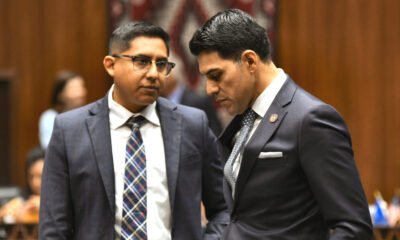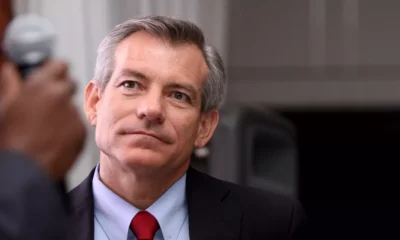arizona
GOP’s Budget Band-Aid Falls Apart as Party Divides Deepen

In a significant setback for House Republicans, plans to vote on a crucial budget patch were abruptly abandoned on Wednesday. This move comes just two weeks before a looming fiscal deadline that could lead to a government shutdown if not addressed.
House Speaker Mike Johnson announced the withdrawal of his proposed six-month continuing resolution just hours before the scheduled vote. The decision followed a notable decline in support from party members, particularly conservatives resistant to maintaining current spending levels.
Johnson emphasized the need for unity within the GOP, stating that they would focus on building consensus. He described ongoing “thoughtful conversations” about the party’s path forward. However, the timeline for a new spending plan remains uncertain, with the current federal budget set to expire on September 30.
Initially, Republican leadership aimed to pair the budget patch with the controversial Safeguard American Voter Eligibility, or SAVE, Act. This legislation would mandate proof of citizenship for voter registration, a provision that has not garnered Democratic support.
Opposition arose swiftly from the party’s conservative wing. Kentucky Representative Thomas Massie remarked on social media that the proposed package was “an insult to Americans’ intelligence.” He criticized it as a “shiny object” that would ultimately be abandoned by leadership.
Representative Marjorie Taylor Greene from Georgia echoed these sentiments, insisting that any continuing resolution should involve a 1% spending cut, otherwise, it would be counterproductive. Other notable opponents included Montana’s Matt Rosendale, Arizona’s Andy Biggs, and Tennessee’s Tim Burchett.
Massie later expressed his relief at the failure of the stopgap measure, calling it a relief from “the production of failure theater.” In contrast, Democrats took advantage of the turmoil, accusing Republicans of politicizing the budget process and urging a bipartisan approach.
House Minority Leader Hakeem Jeffries criticized the Republican stance, reiterating that Democrats would not yield to what he termed “MAGA extremism.” He stressed that a bipartisan solution was essential for government stability. Additionally, Connecticut Representative Rosa DeLauro called for collaborative negotiations to find common ground between the parties.
This breakdown in the leadership’s strategy highlights ongoing factional disputes within the Republican Party, which have complicated government funding efforts. Past delays in passing full-year spending bills in the spring were a direct result of disagreements among party members regarding compromises with Democrats.
Even if the Republicans had managed to rally sufficient votes for the proposed resolution, it faced a bleak future in the Democrat-controlled Senate. With these dynamics at play, the path forward for government funding remains uncertain as the deadline looms.


















